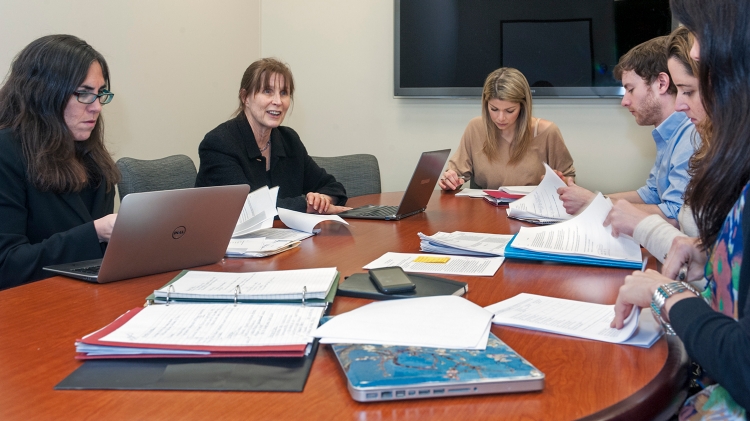
By
With an important major milestone completed, organizers of the Graduate School of Social Work’s social innovation initiative are now planning for its next phase, including an effort to involve other Boston College schools, departments and programs.
Nearly three years ago, GSSW Associate Professors Marcie Pitt-Catsouphes and Stephanie Berzin launched the initiative, establishing a center to coordinate activities that promote social innovation — a growing field that blends entrepreneurship and practices from business/management and other disciplines to address social needs.
Concurrent with the Center for Social Innovation (CSI), Pitt-Catsouphes and Berzin created a program to train GSSW students in integrating macro social work practice and social innovation to unleash their leadership potential and work for sustainable social change. Yet another component was the Social Innovation Lab, created to support social service agencies wishing to develop new responses to social issues.
Recently, the lab — having begun as a pilot program in 2011-12 — marked its first formal year of operation by winding up a partnership with four Greater Boston area social service agencies. Representatives of South Shore Mental Health, Bridge Over Troubled Waters, Old Colony YMCA and Phoenix Charter Academy took part, each focusing on a specific social problem and working with the lab to develop and test potential solutions.
For Bridge Over Troubled Waters (BOTW), which serves homeless youth and young adults, the concern was to ensure their population has access to preventive, not just acute, care. As a result of their work in the Social Innovation Lab, BOTW decided to offer some health and wellness programs, such as yoga classes, instead of relying on hospital services.
“For many of the homeless, Bridge Over Troubled Water is essentially their community,” explains Pitt-Catsouphes.
“The agency also saw an opportunity to encourage their clientele to take interest and responsibility in their own care and treatment. So the yoga classes serve a dual purpose: getting the youths and young adults to think about health and wellness, while providing a gathering place that affirms a sense of community.”
“Our experience in the lab was very rewarding,” says Gregory Perchik, a 2010 GSSW alumnus who is BOTW’s coordinator of outreach and medical services. “We identified a problem, but we were only seeing it from one angle. At the lab, we were able to turn the problem on its head and see it from other perspectives, and find a way to move forward.”
Working with the lab, the Phoenix Charter Academy revised its orientation process to foster a deeper, more enduring engagement with students, as a means for school personnel to better detect academic or social problems. Old Colony YMCA, meanwhile, began a culinary arts institute, providing needed social service, vocational and health/wellness components to its programming.
The role of GSSW students — who act as consultants, working with lab participants on potential solutions and prototypes — is integral to the lab, note Pitt-Catsouphes and Berzin.
“Students don’t take for granted the perceived boundaries or obstacles, and come in with a fresh view,” says Pitt-Catsouphes. “They have their own life experiences and talents to draw upon, as well as the GSSW curriculum and training that prepares them for these challenges.”
Lauren Watt, a Vancouver, Canada, native in her final year at GSSW, said her coursework in Berzin’s class on social innovation opened her to the concept of applying her past business/finance experience to social services. Working in the CSI has deepened her interest in social innovation.
“I think it is a necessary concept for all social workers to become aware of and engaged in so that we as a community and network of social service providers can begin to affect systemic change for social problems that have plagued our society for decades,” says Watt. “Although countless individuals have worked tirelessly to affect change for fundamental, national level issues such as unemployment, homelessness, poverty, we have yet to see an overhaul of these problems and in many cases they have gotten worse.
“Applying socially innovative methodologies and framework is a novel way to readdress these issues and push for tangible change that provides us with a society of healthy, safe, nurtured people.”
Pitt-Catsouphes and Berzin say they are encouraged by CSI’s progress, both on its own terms and in the promise it holds as a model in policy and practice for social work.
“What we’ve seen these past few years is how well social innovation resonates across the disciplines,” says Berzin. “Social work didn’t have much of a place in the discussion about social innovation and its possibilities.
“GSSW,” she asserts, “has put the profession right at the table.”
Adds Pitt-Catsouphes, “It’s been gratifying to see how GSSW students and faculty are embracing the concept of social innovation. Can this same interest and involvement extend elsewhere throughout Boston College? That is one question we’re looking at now.”
Toward that end, Pitt-Catsouphes and Berzin have started a Social Innovation Council, bringing together faculty and administrators from GSSW, the Carroll School of Management, Lynch School of Education, Law School, College of Arts and Sciences — including the Biology, Sociology, Theology, Theatre, Communication and Psychology departments — as well as representatives from the Volunteer and Service Learning Center, PULSE, Boston College Social Entrepreneurs Envisioning Development and other offices and departments.
“We know BC has a tremendous devotion to service for others,” says Pitt-Catsouphes. “So we’re trying to see how this concern for the social good might be integrated, academically and programmatically, in the University. Based on our experiences, social innovation would seem to offer a means to do that.”
To find out more about the Social Innovation Council, contact Pitt-Catsouphes or Berzin.



